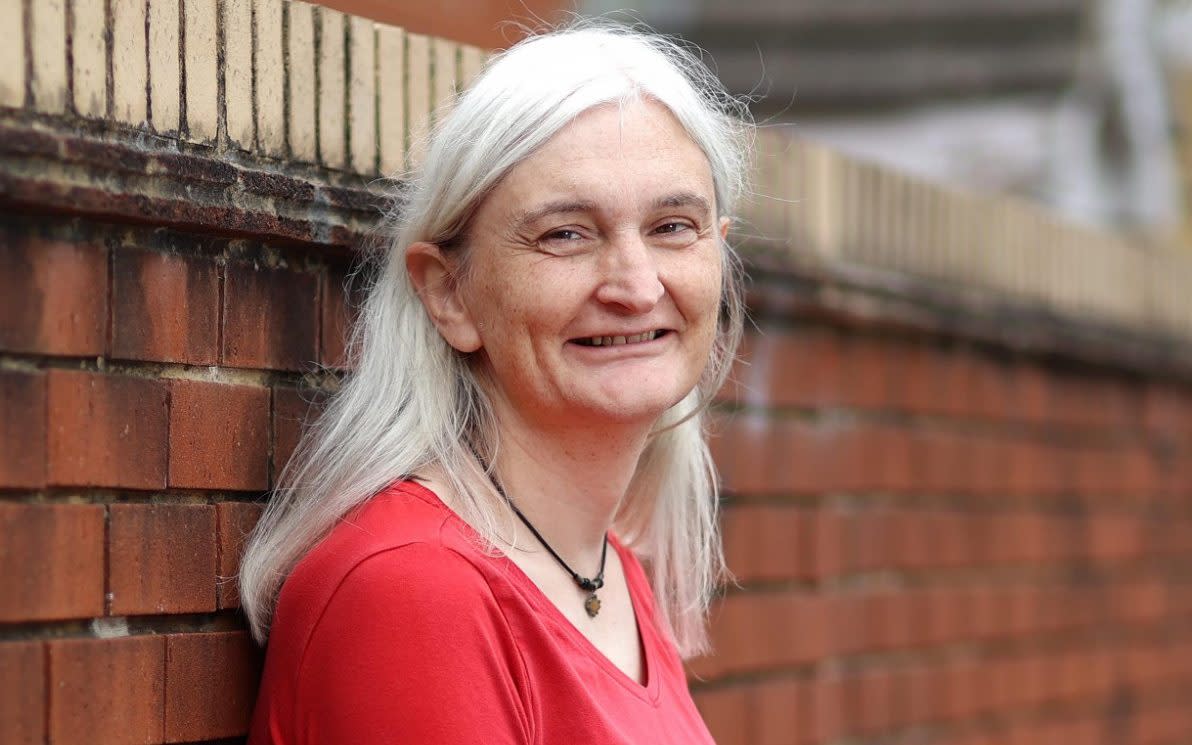Meet the ‘trans apostate’ enraging all sides of the gender war

“Trans Women Are Men. Get Over It!” read the T-shirt that teacher and trade unionist Debbie Hayton designed and wore in 2019. Although a trans woman herself, having undergone gender reassignment surgery in 2016, Hayton was accused of transphobic hate-speech. She was soon, she says, “hounded out” of the Teachers’ Union LGBT committee, which took the opposing view, per Stonewall’s slogan, that “Trans Women Are Women”. It was one of the most shocking clashes in a culture war that demands people pick a team and dismiss everyone on the opposing side of the debate.
In Transsexual Apostate, her brave and deeply considered memoir, Hayton attempts to pick her way through this battleground with more nuance and compassion than the blunt provocation of that old T-shirt slogan might lead readers to expect. Before laying out her issues with “modern gender identification orthodoxy”, Hayton asks us to hear her own history – and here the polemic tone familiar from her newspaper articles takes a softer turn.
Born a biological boy in 1968, Hayton describes a childhood in which most of her interests were “stereotypically male”. Yet she had overwhelming urges to wear women’s clothes. From the age of five, she began rummaging through the kitchen bin for pairs of her mother’s discarded tights. “If circumstances were right,” she recalls, “I could retrieve them before they were covered by potato peelings, soggy teabags, or worse.” These furtive hosiery sessions fed an addictive cycle of anticipation, exhilaration, fear, shame and isolation, which didn’t diminish with puberty. At 14, she started buying women’s clothes for herself.
Studying astronomy and astrophysics at Newcastle University, Hayton met the woman who would become her wife. In the first of a series of wholesale ideological conversions, she adopted Stephanie’s Christian faith. She confessed her gender dysphoria to Stephanie, but struggled to suppress the urge to dress as a woman as they married and had three children. (The latter still call her “Dad” today.) In her forties, the internet brought a new ideology into her life. She says she “lapped up” the belief that she’d been “born in the wrong body with the wrong genitals”. Although she now condemns this ideology as “fantastic nonsense”, she’s honest about how fervently she once believed it.
In 2011, Hayton told her wife, children, friends and colleagues: “I believe I really am a woman.” Her mental health was collapsing: she believed she might die if she continued living as a man. So after five years of “living as a woman”, she went to the Charing Cross Hospital for surgery she describes, in this book, in agonising detail. Although she admits to turning her family’s life “upside down”, Hayton says wider society was generally supportive of her transition. Colleagues were kind, and her pupils at a secondary school in the West Midlands were largely uninterested. She jokes that Van De Graaff generator demonstrations were more fun with long hair. Her newfound confidence allowed her to pursue an interest in politics, and she was flattered to find her views – as a trans woman – sought-after by the LGBT committee.

But as Hayton struggled with the union’s debate over balancing the rights of women with those of trans people, she began to question her ideas of gender and sex and how those terms are defined in law. She worried, in particular, about women’s safety if “anyone” could proclaim themselves female and access their spaces. She feared that the backlash would make the world less safe for trans people, too. In voicing her concerns at a union meeting, she ended up in confrontation with another trans woman who, Hayton claims, spoke out against her in “an outburst of pure fury”, then “slammed her hand into a wall” – and left because she said Hayton made her feel unsafe.
Hayton eventually diagnosed herself with “autogynophelia”, which is defined as “a male’s propensity to be sexually aroused by the thought of himself as female” and is believed to be experienced by 1-3 per cent of men. It’s an uncomfortable diagnosis, risking the contempt of both “sides” of the gender war, so it’s brave of Hayton to proclaim it. “I am not a woman,” she writes, “but I recognise that I need to perceive myself as a woman. And for others to perceive me as such.” She worries about the long-term impacts of medical intervention for children who identify as trans, and she feels grateful that puberty blockers and surgical intervention weren’t available when she was a teenager. She argues, instead, for more exploratory counselling to help with the distress of gender dysphoria.
I’m not qualified to know whether she’s right, and I’m wary of believing that Hayton’s experience can be generalised into that of all gender dysphorics. Yet, having heard very young children tell their non-gender-conforming peers that they “must” be trans, I do agree with Hayton that we should all relax our thoughts around gender stereotypes. It’s common sense to applaud her view that “boys who yearn to express femininity do not need to become girls as part of the deal… [and] girls who are desperate to eschew that same femininity don’t need to identify as non-binary to cut their hair, wear trousers and climb trees.”
I also think that inclusion means listening to all the voices in a debate. Whether you like what Hayton has to say or not, it took guts for her to challenge her own beliefs. Her experience, and Transsexual Apostate, shouldn’t be dismissed.
Transsexual Apostate is published by Forum at £16.99. To order your copy for £14.99, call 0844 871 1514 or visit Telegraph Books